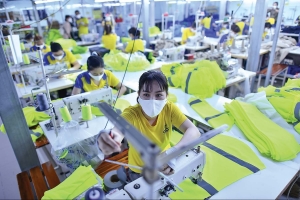Fresh mindset for sustainable groups
Key export markets for Vietnam have been preparing specific regulations on sustainable production linked to environmental protection. Is the pressure weighing heavily on Vietnamese businesses, especially those engaged in exports?
 |
| Trinh Thi Huong, deputy head of the Business Development Department at the Ministry of Planning and Investment |
At this point, it’s no longer just pressure, it’s a necessity. Vietnamese businesses, especially those involved in exports or participating in global supply chains, must undergo a green transformation to avoid being excluded from the game due to the high environmental, social, and governance (ESG) standards set by importing markets.
The European Union has issued numerous regulations related to green and sustainable development. For instance, the EU Deforestation Regulation introduces mandatory requirements starting in 2024, targeting products with the most significant impact on deforestation, including items like coffee, cocoa, soybeans, palm oil, livestock, wood, and wood-based products.
Exporters of these goods to the European market must undergo supply chain assessments to ensure no production on deforested land or forest degradation.
The EU also imposes strict regulations on imported goods, such as the European Green Deal accompanied by mechanisms and programmes like the Carbon Border Adjustment Mechanism (CBAM). Since October 2023, the CBAM has been implemented on a trial basis for the transition phase and is expected to be fully enforced from 2026.
In the short term, it will affect four export items from Vietnam to the EU, namely steel, aluminium, cement, and fertiliser. However, after 2026, the scope could expand, covering indirect carbon emission taxes and many products emitting carbon gases into the environment, such as organic chemicals and plastics. Finally, the Emissions Trading System will significantly impact all goods exported from Vietnam to the EU within the scope of regulation.
Other markets worldwide are also following the CBAM trend. For example, the US Clean Competition Act is expected to be applied from 2024 for raw goods and from 2026 for both raw and finished goods. The law covers a broader range of sectors than the CBAM, applying to 12 industries and extending to additional sectors, such as the glass and paper industries.
In this trend, it is crucial for Vietnamese businesses to clearly understand the need to change their mindset, focusing on the green factor in production, supply chains, and trade to meet the stringent requirements of the international market.
At that point, compliance pressure becomes a driving force for businesses that have chosen to go green, implement ESG practices, and engage in sustainable business. They will proactively seize new market opportunities and be better prepared for the stringent requirements of Vietnam’s main export markets now and in the future.
To provide specific and practical support to businesses on this, we have collaborated with the US Agency for International Development through a private sector competitiveness enhancement project in Vietnam, organising ESG Initiative Vietnam.
What benefits can businesses gain from this initiative?
ESG Initiative Vietnam 2024 was launched at the end of last year. With this message, we encourage businesses to proactively embrace new opportunities amidst the green transformation and enhance competitiveness when participating in global supply chains.
The initiative will continue to sponsor trials, implement, or replicate excellent initiatives to promote sustainable business models, with total technical support valued at up to $82,000 for three winning businesses. Some prominent technical support categories include enhancing ESG capabilities, green transformation, strategic consulting, and action plan development for sustainable business, sustainable development reporting, conducting greenhouse gas audits, and developing emission reduction plans.
Participating businesses will be supported in accessing partners within and outside the country that support sustainable business ecosystems, expanding partner relationships, learning and enhancing knowledge and experience in implementing ESG and sustainable business models, and accessing support schemes from the government, investment funds, and credit organisations for sustainable businesses in Vietnam.
This is the second year that ESG Initiative Vietnam has been held and has attracted nearly 150 applications from private enterprises, cooperatives, and individual businesses.
What support is there for businesses that are new to ESG?
The Ministry of Planning and Investment (MPI) has issued guidance on implementing an initiative to support sustainable businesses in the private sector since 2022. It introduces tools for assessing sustainable business that allow enterprises to self-assess and measure the effectiveness of their business models based on sustainable criteria, aiming for a balanced integration of economic benefits with environmental protection, human development, and overall societal wellbeing.
These tools make it easy for businesses to self-assess various sustainable business models such as ESG practices, circular economy applications, and comprehensive business models. Developed based on widely recognised standards, these tools are adjusted to suit the specific context of Vietnamese businesses, especially small and medium-sized enterprises.
Implementing both sustainable business models and ESG practices will help businesses meet the requirements of the market, partners, and investors; access green investment sources; and enhance their image and brand in both domestic and international markets.
This is a great opportunity for businesses to turn pressure into motivation and create new values for the enterprise.
 | Green transition creating challenges for garments and textiles SMEs Vietnam has signed 16 free trade agreements (FTAs) with the international community, creating the conditions for firms to expand into new markets and boost profitability, while also posing numerous challenges with their increasingly stringent 'green growth' requirements. |
What the stars mean:
★ Poor ★ ★ Promising ★★★ Good ★★★★ Very good ★★★★★ Exceptional
Related Contents
Latest News
More News
- PM outlines new tasks for healthcare sector (February 25, 2026 | 16:00)
- Ho Chi Minh City launches plan for innovation and digital transformation (February 25, 2026 | 09:00)
- Vietnam sets ambitious dairy growth targets (February 24, 2026 | 18:00)
- Masan Consumer names new deputy CEO to drive foods and beverages growth (February 23, 2026 | 20:52)
- Myriad risks ahead, but ones Vietnam can confront (February 20, 2026 | 15:02)
- Vietnam making the leap into AI and semiconductors (February 20, 2026 | 09:37)
- Funding must be activated for semiconductor success (February 20, 2026 | 09:20)
- Resilience as new benchmark for smarter infrastructure (February 19, 2026 | 20:35)
- A golden time to shine within ASEAN (February 19, 2026 | 20:22)
- Vietnam’s pivotal year for advancing sustainability (February 19, 2026 | 08:44)

 Tag:
Tag:




















 Mobile Version
Mobile Version